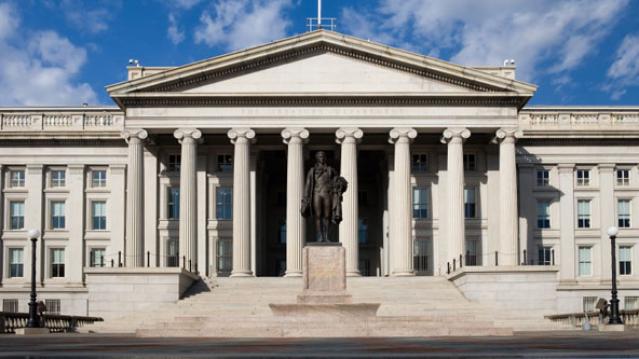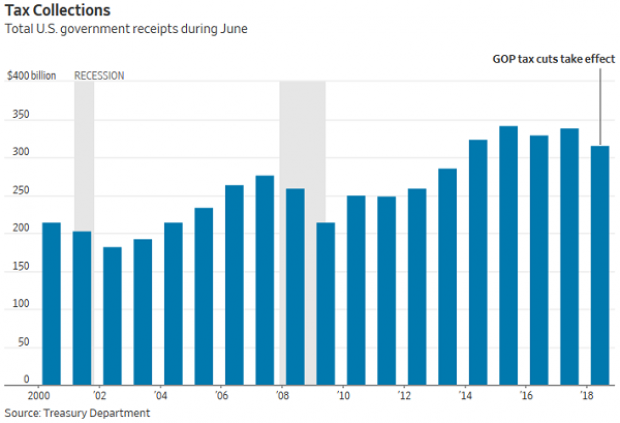The Crazy Reason Treasury Department Officials Can’t Get Their Work Done
Treasury Department officials are being driven to distraction these days, but it’s not because of the expiring debt ceiling or other pressing financial controversies.
Instead, loud music from a New Orleans-style street band known as Spread Love has reportedly driven some officials and employees at the Treasury building to wear earphones to block out the noise and even move meetings to other parts of the building to find some peace and quiet.
Related: The Next Debt Crisis Could Be Much Worse than in 2013, GAO Warns
“We have to relocate our conference calls,” one Treasury employee told The Washington Post. “We can’t have meetings in that corner of the building anymore. It’s like they’re playing music in the building.”
Members of Spread Love have become fixtures of downtown Washington’s street scene and are collecting generous donations for playing their drums, trombone and other brass instruments. Tourists and other office workers out during their lunch hour appear to love the group, but not so the serious-minded economists and bean counters at the Treasury – especially when the band moves within easy shouting distance at the corner of 15th and G Streets NW.
Treasury Secretary Jack Lew’s staff members aren’t the only ones complaining about the jarring music. Partners and associates at the law firm of Skadden, Arps, Slate, Meagher & Flom find it hard to concentrate on their cases with daily interruptions. It got to the point that the firm dispatched a security guard to offer band members $200 a week if they would play somewhere else. Lonnie Shepard, one of the trombonists, told the newspaper that he laughed at the offer because “We can make that in an hour.”
Related: End of Sanctions Worth Hundreds of Billions to Iran
Rob Runyan, a spokesperson for the Treasury Department, said that employee complaints have made their way to the office of the assistant secretary for management, Brodi Fontenot, but there really wasn’t much that could be done.
“The band and other street noise are part of the distractions of working in downtown D.C.,” Runyan said in an interview Friday.
Economists See More Growth Ahead

Most business economists in the U.S. expect the economy to keep chugging along over the next three months, with rising corporate sales driving additional hiring and wage increases for workers.
The tax cuts, however, don’t seem to be playing a role in hiring and investment plans. And the trade conflicts stirred up by the Trump administration are having a negative influence, with the majority of economists at goods-producing firms who replied to the most recent survey by the National Association for Business Economics saying that their companies were putting investments on hold as they wait to see how things play out.
New Tax on Non-Profits Hits Public Universities

The Republican tax bill signed into law late last year imposed a 21 percent tax on employees at non-profits who earn more than $1 million a year. According to data from the Chronicle of Higher Education cited by Bloomberg, there were 12 presidents of public universities who received compensation of at least $1 million in 2017, with James Ramsey of the University of Louisville topping the list at $4.3 million. Endowment managers could also get hit with the tax, as could football coaches, some of whom earn substantially more than the presidents of their institutions.
Government Revenues Drop as Tax Cuts Kick In

Corporate tax receipts in June were 33 percent lower than a year ago, according to data released by the Treasury Department Thursday, as companies made smaller estimated payments due to the reduction in their tax rates. Total receipts were down 7 percent, while payroll taxes were 5 percent lower compared to June 2017.
“June receipts to US government were our first mostly-clear look at the revenue effects of the new tax law, with lots of estimated payments and little noise from the 2017 tax year,” The Wall Street Journal’s Richard Rubin tweeted Friday.
Surprisingly, the deficit was smaller in June compared to a year ago, narrowing to $74.86 billion from $90.23 billion last year. The drop was driven by a 9 percent reduction in government outlays that reflected accounting changes rather than any real changes in spending, Rubin said in the Journal.
“More broadly, the federal deficit is swelling as government spending outpaces revenues,” Rubin wrote. “The budget gap totaled $607.1 billion in the first nine months of the 2018 fiscal year, 16% larger than the same point a year earlier.”
Kyle Pomerleau of the Tax Foundation pointed out that the drop in corporate tax receipts is a permanent feature of the Republican tax cuts, tweeting: “Even in a Trump dream world in which these cuts paid for themselves, corporate tax collections would remain below baseline forever. It would be higher income and payroll receipts that made up the difference.”
Deficit Jumps in Trump’s First Fiscal Year

The federal budget deficit rose by 16 percent in the first nine months of the 2018 fiscal year, which began last October. The shortfall came to $607 billion, compared to $523 billion in the same period the year before, according to a U.S. Treasury report released Thursday and reported by Bloomberg. Both revenue and spending rose, but spending rose faster. Revenues came to $2.54 trillion, up 1.3 percent from the same nine-month period in 2017, while spending came to $3.15 trillion, up 3.9 percent.
Where’s the Obamacare Navigator Funding for 2019, PA Insurance Commissioner Asks
Pennsylvania’s insurance commissioner sent a letter this week to Health and Human Services Secretary Alex Azar and Centers for Medicare and Medicaid Services (CMS) Administrator Seema Verma requesting that they “immediately release the funding details for the Navigator program for the upcoming open enrollment period for 2019.” Navigators are the state and local groups that help people sign up for Affordable Care Act plans.
“In years past, grant applications and new funding opportunities were released by CMS in April, CMS required Navigator organizations to apply by June and approved applications and new funding by late August,” Pennsylvania’s Jessica Altman wrote. “The current lack of guidance has put Navigator organizations – and states - far behind in their planning and creates an inability for the Navigator organizations to design a successful plan for helping people enroll during the 2019 open enrollment period.”

